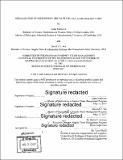Serialization of prescription drugs in the USA : a centralized view
Author(s)
Nabiyeva, Aisha; Wu, David Z. Y
DownloadFull printable version (6.033Mb)
Alternative title
Serialization of prescription drugs in the United States of America : a centralized view
Other Contributors
Massachusetts Institute of Technology. Supply Chain Management Program.
Advisor
Bruce C. Arntzen.
Terms of use
Metadata
Show full item recordAbstract
This thesis explores the impact of the Drug Supply Chain Security Act (DSCSA) on various stakeholders in the pharmaceutical supply chain. Specific attention has been dedicated to the impact on manufacturers and distributors/retailers. Although various interpretations of the DSCSA are possible, this thesis takes the perspective of a centralized data model, and tests the feasibility of implementing a centralized database under both data nesting and unit level relational models. This is in contrast to the decentralized system, which is further explored in the partner thesis, Impact of Drug Supply Chain Security Act on US pharmaceutical industry under decentralized information flow (Chang & Mohan, 2017). Both quantitative and qualitative analysis are employed in this thesis. Quantitative analysis was conducted using publically available industry data, from which the impact on overall supply chain costs was modeled. Qualitative analysis consisted of stakeholder interviews, process mapping, and time studies to determine the extent of process changes and what they should look like to conform to DSCSA. After accounting for the current state of implementation, as well as real-world constraints, the findings indicate that the best-practice scenario for Manufacturers and Distributors/Retailers to conform to DSCSA is one using a Centralized data model and nested linked-pedigrees. Although this option is estimated to be 67% costlier than the least expensive scenario, it offers a more robust and secure data model that allows for better long-term scalability. Implementation and cost concerns are also discussed in the conclusion to elaborate on trends and considerations in choosing the appropriate Serialization scenario to pursue.
Description
Thesis: M. Eng. in Supply Chain Management, Massachusetts Institute of Technology, Supply Chain Management Program, 2017. Cataloged from PDF version of thesis. Includes bibliographical references (pages 48-49).
Date issued
2017Department
Massachusetts Institute of Technology. Supply Chain Management ProgramPublisher
Massachusetts Institute of Technology
Keywords
Supply Chain Management Program.